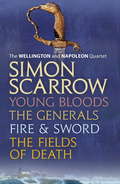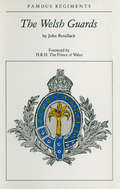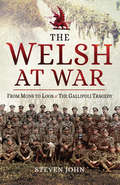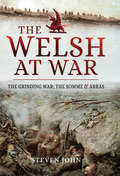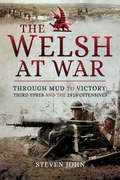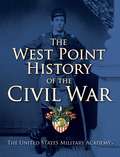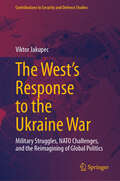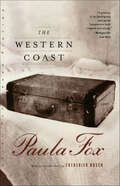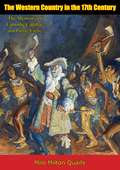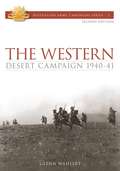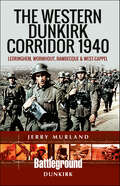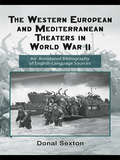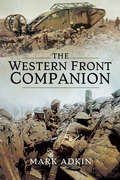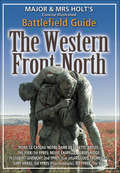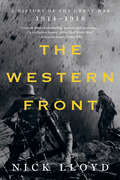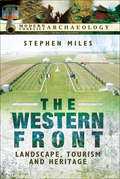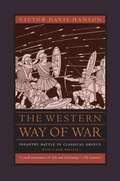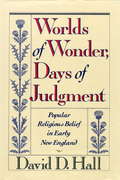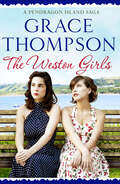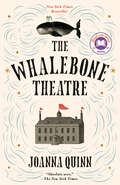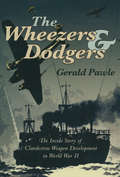- Table View
- List View
The Wellington and Napoleon Quartet: Young Bloods, The Generals, Fire and Sword, Fields of Death
by Simon ScarrowSimon Scarrow's four classic novels based on the lives of the Duke of Wellington and Napoleon Bonaparte are published together in one superb-value ebook volume not to be missed by readers of Bernard Cornwell. Arthur, Duke of Wellington, and Emperor Napoleon Bonaparte were adversaries on an epic scale. Across Europe and beyond, the armies of Great Britain and France clashed, from the Iberian Peninsula to India, from Austerlitz to the final confrontation at Waterloo. What drove the two clever, ambitious, determined men who masterminded these military campaigns? How did the underdog from Corsica develop the strategic military skills and the political cunning that gave him power over swathes of Europe? And how did Wellington, born to be a leader, hone his talents and drive an army to victory after victory?From an outstanding historian and novelist come four epic novels, now available in one volume for the first time, which tell the full story of both these men, from their very early days till the momentous battle at Waterloo which decided the future of Europe.INCLUDES MAPS
The Wellington and Napoleon Quartet: Young Bloods, The Generals, Fire and Sword, Fields of Death
by Simon ScarrowSimon Scarrow's four classic novels based on the lives of the Duke of Wellington and Napoleon Bonaparte are published together in one superb-value ebook volume not to be missed by readers of Bernard Cornwell. Arthur, Duke of Wellington, and Emperor Napoleon Bonaparte were adversaries on an epic scale. Across Europe and beyond, the armies of Great Britain and France clashed, from the Iberian Peninsula to India, from Austerlitz to the final confrontation at Waterloo. What drove the two clever, ambitious, determined men who masterminded these military campaigns? How did the underdog from Corsica develop the strategic military skills and the political cunning that gave him power over swathes of Europe? And how did Wellington, born to be a leader, hone his talents and drive an army to victory after victory?From an outstanding historian and novelist come four epic novels, now available in one volume for the first time, which tell the full story of both these men, from their very early days till the momentous battle at Waterloo which decided the future of Europe.INCLUDES MAPS
The Welsh Girl: A Novel
by Peter Ho DaviesA WWII-era Welsh barmaid begins a secret relationship with a German POW in this &“beautiful&” novel by the author of A Lie Someone Told You About Yourself (Ann Patchett). Longlisted for the Man Booker Prize Set in the stunning landscape of North Wales just after D-Day, this critically acclaimed debut novel traces the intersection of disparate lives in wartime. When a prisoner-of-war camp is established near her village, seventeen-year-old barmaid Esther Evans finds herself strangely drawn to the camp and its forlorn captives. She is exploring the camp boundary when an astonishing thing occurs: A young German corporal calls out to her from behind the fence. From that moment on, the two begin an unlikely—and perilous—romance. Meanwhile, a German-Jewish interrogator travels to Wales to investigate Britain&’s most notorious Nazi prisoner, Rudolf Hess. In this richly drawn and thought-provoking &“tour de force,&” all will come to question the meaning of love, family, loyalty, and national identity (The New Yorker). &“If you loved The English Patient, there&’s probably a place in your heart for The Welsh Girl.&” —USA Today &“Davies&’s characters are marvelously nuanced.&” —Los Angeles Times &“Beautifully conjures a place and its people, in an extraordinary time . . . A rare gem.&” —Claire Messud, author of The Woman Upstairs &“This first novel by Davies, author of two highly praised short story collections, has been anticipated—and, with its wonderfully drawn characters, it has been worth the wait.&” —Booklist, starred review
The Welsh Guards
by John RetallackAlthough the youngest of the Regiments in the Household Division, the Welsh Guards have established a reputation on both the battlefield, and on the parade ground, that is fully equal to the proud standards for which Guardsmen have long been famous. The Welsh Guards were formed in 1915, and they saw much hard fighting in both World Wars. Of the first thirty years of their existence, almost a third were spent at war and as a result tradition and regimental spirit were quickly forged. Such is the variety of a modern soldier's life that in the years since the Second World War, the Welsh Guards have been employed in sixteen different countrys, (in some of them two or three times) as diverse as texas and the snows of artic Norway. This swift account takes their story from the regiment's foundation in 1915, from their baptism of fire at loos, through another World War, and on to the tragic business of trying to preserve lives, and some sort of life, in the internecine bitterness of Northern Ireland.
The Welsh at War: The Somme And Arras
by Steven JohnWelsh at War From Mons to Loos and the Gallipoli Tragedy is the culmination of twelve years of painstaking research by the author into the the Welsh men and infantry units who fought in the Great War.These units included the four regular regiments the Royal Welsh Fusiliers, South Wales Borderers Welsh Regiment and Welsh Guards as well as the Territorial Monmouthshire Regiment, the Yeomanry regiments, the Denbighshire Hussars, Pembroke Yeomanry, Montgomeryshire Yeomanry, Glamorgan Yeomanry and Welsh Horse Yeomanry and their amalgamation into service battalions for the regular regiments during 1917.Welsh troops fought with great courage in every theater of the war the Western Front, Aden, China, Gallipoli, Egypt, India, Italy, Salonika and in Palestine and as well as the casualties who were suffered during these campaigns, many men gained recognition for acts of gallantry.The book covers all of the major actions and incidents in which each of the Welsh infantry regiments took part from the opening of the war in 1914 until the end of 1915, as well as stories of Welsh airmen, Welshmen shot at dawn, Welsh rugby players who fell, Welsh gallantry winners and the Welshmen who died in non-Welsh units, such as the Dominion forces and other units of the British Armed Forces.While chronicling a history of the war through the events and battles that Welshmen took part in, the stories of individual casualties are included throughout, together with many compelling photographs of the men and their last resting places.
The Welsh at War: The Somme and Arras
by Steven JohnThe Welsh at War trilogy is the culmination of over twelve years of painstaking research by the author into the Welsh men and infantry units who fought in the Great War.These units included the four regular regiments the Royal Welsh Fusiliers, South Wales Borderers Welsh Regiment and Welsh Guards as well as the Territorial Monmouthshire Regiment, the Yeomanry regiments: the Denbighshire Hussars, Pembroke Yeomanry, Montgomeryshire Yeomanry, Glamorgan Yeomanry and Welsh Horse Yeomanry and their amalgamation into service battalions for the regular regiments during 1917.Welsh troops fought with great courage in every theater of the war the Western Front, Aden, China, Gallipoli, Egypt, India, Italy, Salonika and in Palestine and in addition to the casualties suffered during these campaigns, many men gained recognition for acts of gallantry.The three volumes, split chronologically, cover all of the major actions and incidents in which each of the Welsh infantry regiments took part, as well as stories of Welsh airmen, Welshmen shot at dawn, Welsh rugby players who fell, Welsh gallantry winners and the Welshmen who died in non-Welsh units, such as the Dominion forces and other units of the British armed forces.The Welsh at War records the gallant work of Welsh units and servicemen during the period between the arrival of the 38th (Welsh) Division in France during December 1915 until the aftermath of the Battle of Arras in the summer of 1917, covering: the campaigns in Mesopotamia, Salonika, Egypt and Palestine; the Battle of Jutland; the Somme offensive; the German Withdrawal to the Hindenburg Line; the Battle of Arras; the Battle of Messines Ridge; and the build up to the Third Battle of Ypres.
The Welsh at War: Third Ypres and the 1918 Offensives
by Steven JohnWelsh at War From Mons to Loos and the Gallipoli Tragedy is the culmination of twelve years of painstaking research by the author into the the Welsh men and infantry units who fought in the Great War.These units included the four regular regiments the Royal Welsh Fusiliers, South Wales Borderers Welsh Regiment and Welsh Guards as well as the Territorial Monmouthshire Regiment, the Yeomanry regiments, the Denbighshire Hussars, Pembroke Yeomanry, Montgomeryshire Yeomanry, Glamorgan Yeomanry and Welsh Horse Yeomanry and their amalgamation into service battalions for the regular regiments during 1917.Welsh troops fought with great courage in every theater of the war the Western Front, Aden, China, Gallipoli, Egypt, India, Italy, Salonika and in Palestine and as well as the casualties who were suffered during these campaigns, many men gained recognition for acts of gallantry.The book covers all of the major actions and incidents in which each of the Welsh infantry regiments took part from the opening of the war in 1914 until the end of 1915, as well as stories of Welsh airmen, Welshmen shot at dawn, Welsh rugby players who fell, Welsh gallantry winners and the Welshmen who died in non-Welsh units, such as the Dominion forces and other units of the British Armed Forces.While chronicling a history of the war through the events and battles that Welshmen took part in, the stories of individual casualties are included throughout, together with many compelling photographs of the men and their last resting places.
The West Point Candidate Book
by William L. SmallwoodA "how to" book for those who want to go to West Point - how to prepare, how to get in, and how to survive after you get there.
The West Point History of the Civil War
by The United States Military Academy Clifford Rogers Colonel Ty SeiduleThe definitive military history of the Civil War, featuring the same exclusive images, tactical maps, and expert analysis commissioned by The United States Military Academy to teach the history of the art of war to West Point cadets.The United States Military Academy at West Point is the gold standard for military history and the operational art of war. West Point has created military history texts for its cadets since 1836. For the first time in over forty years, the United States Military Academy has authorized a new military history series that will bear the name West Point. That text has been updated repeatedly, but now it has been completely rewritten and The West Point History of the Civil War is the first volume to result in a new series of military histories authorized by West Point.The West Point History of the Civil War combines the expertise of preeminent historians commissioned by West Point, hundreds of maps uniquely created by cartographers under West Point's direction, and hundreds of images, many created for this volume or selected from West Point archives. Offering careful analysis of the political context of military decisions, The West Point History of the Civil War is singularly brilliant at introducing the generals and officer corps of both Union and Confederacy, while explaining the tactics, decisions, and consequences of individual battles and the ebb and flow of the war. For two years it has been beta-tested, vetted, and polished by cadets, West Point faculty, and West Point graduates and the results are clear: This is the best military history of its kind available anywhere.
The West's Response to the Ukraine War: Military Struggles, NATO Challenges, and the Reimagining of Global Politics (Contributions to Security and Defence Studies)
by Viktor JakupecThis book examines the political, diplomatic, and financial responses to the Russo-Ukraine War through the lens of Realist international relations theory. Analyzing the origins and ongoing dynamics of the conflict, the book sheds light on how the West - especially the EU and NATO - has reacted to the war and discusses the implications of its strategy. It critically explores the influence of national populism and internal disunity within the West, particularly against the background of rising Trumpism. The book offers a fresh perspective on the geopolitical shifts reshaping power dynamics and traditional international relations. From Ukraine's military struggles to NATO’s challenges, it analyzes how the conflict has disrupted existing political norms. The book makes a case for rethinking the global political framework as the war continues to evolve and will appeal to students, scholars, and researchers of international relations and geopolitics. “This book offers a timely analysis of the Russo-Ukraine War and its transformative impact on global geopolitics. Examining the conflict's origins, strategies, and broader implications provides essential insights into shifting international dynamics and challenges to traditional geopolitical paradigms, making it an invaluable resource for understanding the current crisis and evolving frameworks of global relations.” Lisheng Dong, Emeritus Professor at the University of Tartu and former Visiting Professor at the University of Zurich “The West’s Response to the Ukraine War is a bravura performance. Highly recommended for public and academic libraries.” Joseph M. Siracusa, Professor of Global Futures, Curtin University, Perth Australia
The Western Coast: A Novel
by Paula FoxAmerica and the catastrophic world of twentieth-century war, mass murder, and horror are the backdrop of this story of Annie Gianfala, a young woman who finds herself cast adrift in Hollywood with World War II looming. Defending herself with despairing stubbornness against personal catastrophe, she is able to save her life and escape. "Enormously touching and wholly believable."—Washington Post Book World
The Western Country in the 17th Century: The Memoirs of Lamothe Cadillac and Pierre Liette
by Milo Milton QuaifeThis book, which was first published in 1947, comprises the memoirs of Antoine Lamothe Cadillac and Pierre Liette, two French officers who, during the late 1600’s and early 1700’s, lived peaceably with the Indians in the valley of the Mississippi from the Ohio River to north of Lake Superior.Antoine Laumet de la Mothe, sieur de Cadillac (1658-1730) rose from a modest beginning in Acadia in 1683 as an explorer, trapper, and a trader of alcohol and furs. He achieved various positions of political importance in the colony. He was the commander of Fort de Buade, modern-day St. Ignace, Michigan, in 1694. On July 24, 1701, Antoine de La Mothe-Cadillac, helped by Alphonse de Tonti, founded Fort Pontchartrain and the parish of Sainte-Anne on the straits (“le détroit” in French), which would become the future city of Detroit. In 1702, Cadillac requested the monopoly of all fur-trading activities and the transfer to his authority of the Amerindian tribes in the area of the straits. He became a shareholder in the “Company of the Colony.” After return to the straits, he helped in welcoming and settling the native tribes formerly installed at Michillimakinac.Pierre-Charles de Liette (c.1672-1729) was an Italian who moved to French North America and enrolled there as French soldier. Born PierCarlo Di Lietto, he served as aide to Henri de Tonti, as commandant at Fort Saint-Louis and Chécagou, and as a captain in the colonial regular troops from 1687-1729. From 1702-1711 De Liette remained the only representative of the French government among the Indians in the Illinois area, mainly because of his knowledge of their language. He was in charge of mediation between the Miami and Illinois tribes and was successful even with countering the English trade ventures in the area. De Liette fought bravely against the Fox tribe and in 1725 was named Commandant of the “Illinois country” while in charge of the Fort de Chartres.
The Western Desert Campaign 1940-41 (Australian Army Campaigns Series #2)
by Glenn WahlertWhile the North African campaign has been studied in detail over the years, much of this study has been dedicated to the battles between the British 8th Army and Rommel's Afrika Korps. There has been little serious study of Wavell's campaign against Italian forces in 1940- 41, nor of the role played by the Australian 6th Division in the eventual Italian defeat. Part of this can be attributed to wartime propaganda that labelled the Italian Army dilettantes and mocked their courage. The truth is much different. Many Italian units showed incredible bravery, and the Australian assaults on fortress towns such as Bardia were far from a walkover. Today's aspiring military commanders need look no further than the early Western Desert campaign for historical examples of brilliant leadership, detailed planning, deception, surprise, manoeuvre warfare and relentless pursuit, all against overwhelming odds.
The Western Dunkirk Corridor 1940: Ledringhem, Wormhout and West Capelle (Battleground Dunkirk)
by Jerry MurlandThe story of 144 Brigade’s defense of Wormhoudt and Bambecque must rank in importance alongside the defense of Cassel and Hazebrouck by 145 Brigade; however, what is often forgotten in the uncertainty that surrounded Wormhoudt and Bambeque is the heroic defense of West Cappel and Vwyfeg (les Cinq Chemins today) by the Welsh Guards and the 1/Fife and Forfar Yeomanry (1/F&F Yeomanry). Brigadier Norman’s composite brigade was the final piece in the jigsaw of defense on the western flank of the Dunkerque Corridor and, after the last stand of the 2/Royal Warwicks and the 8/Worcesters, Norman’s Brigade, held the line south of Bergues, containing the attacking German units at great cost, until the perimeter at Dunkerque had been established. He and the remnants of his brigade left Yvfweg just as the Germans were entering it from the south. The full story of the evacuation of the BEF from Dunkerque can be read in Battleground Europe: The Dunkerque Perimeter and Evacuation 1940. The defense of Wormhoudt in 1940 has long been associated with the massacre of British servicemen after they had surrendered and been taken prisoner. The events in the barn at La Plaine au Bois will always be considered one of the most appalling acts of the Second World War, carried out by elements of the Liebstandarte Regiment, in what looked very much like revenge; a massacre that was almost second nature to this group of fanatical followers of Adolf Hitler. Up against the regular troops of the 2/Warwicks and their supporting units, the Liebstandarte found no easy victory at Wormhoudt in an encounter that saw their regimental commander, Gruppenführer Otto ‘Sepp’ Dietrich, having to take shelter in a roadside ditch away from the fury of the Cheshire machine gunners. Then again, what is often overshadowed by the events in the barn is the series of other murders of civilians and British soldiers that took place as the Liebstandarte overwhelmed the fragile defense of the Warwicks. Captain ‘Tony’ Crook, the Warwicks’ Medical Officer, draws attention to just one of these incidents as he was marched into captivity past the bodies of A Company men, who he felt sure had been murdered in cold blood. Another incident involving the Worcesters at Bambecque is related by Lieutenant Roger Cleverley of C Company, who writes in his diary that all the wounded were shot by a commander of the Liebstandarte. Apart from hearsay and diary entries, there is little other evidence to support the deaths of these men but, in the opinion of the author, there is no doubt whatever that many British soldiers met a premature end after they had surrendered in the fields and on the pavements of Wormhoudt and Bambecque.
The Western European and Mediterranean Theaters in World War II: An Annotated Bibliography of English-Language Sources (Routledge Research Guides to American Military Studies)
by Donal SextonThe Western European and Mediterranean Theaters in World War II is a concise, comprehensive guide for students, teachers, and history buffs of the Second World War. With an emphasis on the American forces in these theaters, each entry is accompanied by a brief annotation that will allow researchers to navigate through the vast amount of literature on the campaigns fought in these regions with ease. Focusing on all aspects surrounding the U.S. involvement in the Western European and Mediterranean theaters, including politics, religion, biography, strategy, intelligence, and operations, this bibliography will be a welcome addition to the collection of any academic or research library. Routledge Research Guides to American Military Studies provide concise, annotated bibliographies to the major areas and events in American military history. With the inclusion of brief critical annotations after each entry, the student and researcher can easily assess the utility of each bibliographic source and evaluate the abundance of resources available with ease and efficiency. Comprehensive, concise, and current—Routledge Research Guides to American Military Studies are an essential research tool for any historian.
The Western Front Companion: The Complete Guide To How The Armies Fought For Four Devastating Years, 1914-1918
by Mark AdkinThe definitive guide to the main theater of WWI—&“maps of the battles . . . military strategy . . . extraordinary anecdotes . . . it&’s a triumph&” (Daily Mail). Written by the author of the three previous bestselling Companions on Waterloo, Trafalgar and Gettysburg—now acclaimed as the definitive work of reference on each battle—The Western Front Companion is not a mere chronological account of the fighting. Rather, it is an astonishingly comprehensive and forensic anatomy of how and why the armies fought, of their weapons, equipment and tactics, for over four long and bloody years on a battlefield that stretched from the Belgian coast to the Swiss frontier—a distance of 450 miles. Alongside the British Army, full coverage is given to Britain&’s allies—France, Belgium, Australia, New Zealand, Canada, South Africa, India and the United States—as well as the Germans. The 350,000 words of text range over everything from the railways on the front to the medical corps and the chaplains. Like previous Companions, this book is equally distinguished by its magnificent visual resources—original and intricate maps and diagrams, over 200 resonant and remarkable archive images from the time (many rarely seen), and modern color photographs showing how historic battlefields look nowadays, and paying tribute to the magnificent and poignant cemeteries, monuments and ossuaries that mark the fallen for today&’s battlefield visitor. Every reader, no matter how well informed already on the history of World War I, will learn something new from this extraordinary and exhaustive volume. No one interested in the true story and sheer sweep of the Great War on the Western Front can afford to be without it.
The Western Front-North: 100th Anniversary Edition (Major & Mrs Holt's Concise Illustrated Battlefield Guide)
by Tonie Holt Valmai HoltFollowing in their best-selling series of Battlefield Guides this is a companion volume to the Holts Western Front South Guide. Between the two, they cover the main WW1 Western Front battlefields. This book covers 15 of the most significant battles of the northern area from Nieuwport to just north of The Somme.Whether travelling on the ground or in the mind, the reader is carefully guided through the battlefields with a mixture of succinct military history, cameo memories and stories of VCs and other personalities, interspersed with references to the literature and poetry of the war.This guidebook is based on Tonie and Valmai Holt's 30 years experience of researching, guiding tours and writing about the area, with their unique blend of male and female points of view. It is written to the high standards that have come to be expected of these highly respected authors who are credited with pioneering the modern battlefield tour and whose guide books are referred to as 'The Bibles' . This new edition contains: Brief Historical Background and Summary of each battle, Opening Moves and What Happened, with appropriate quotations Sketch Map for each battle showing battle lines, routes etc and all points of interest described on each timed itinerary Large Sketch Map putting the battlefields (north and south) into perspective Memorials, Museums, Sites of Interest (bunkers, craters etc) War Grave Cemeteries Allied and German GPS Location for every recommended stop War Graves and Commemorative Associations Cameos about individual personalities Useful Tourist Information Where to stay and eat
The Western Front: A History Of The Great War, 1914-1918
by Nick Lloyd“A tour de force of scholarship, analysis and narration.… Lloyd is well on the way to writing a definitive history of the First World War.” —Lawrence James, Times The Telegraph • Best Books of the Year The Times of London • Best Books of the Year A panoramic history of the savage combat on the Western Front between 1914 and 1918 that came to define modern warfare. The Western Front evokes images of mud-spattered men in waterlogged trenches, shielded from artillery blasts and machine-gun fire by a few feet of dirt. This iconic setting was the most critical arena of the Great War, a 400-mile combat zone stretching from Belgium to Switzerland where more than three million Allied and German soldiers struggled during four years of almost continuous combat. It has persisted in our collective memory as a tragic waste of human life and a symbol of the horrors of industrialized warfare. In this epic narrative history, the first volume in a groundbreaking trilogy on the Great War, acclaimed military historian Nick Lloyd captures the horrific fighting on the Western Front beginning with the surprise German invasion of Belgium in August 1914 and taking us to the Armistice of November 1918. Drawing on French, British, German, and American sources, Lloyd weaves a kaleidoscopic chronicle of the Marne, Passchendaele, the Meuse-Argonne, and other critical battles, which reverberated across Europe and the wider war. From the trenches where men as young as 17 suffered and died, to the headquarters behind the lines where Generals Haig, Joffre, Hindenburg, and Pershing developed their plans for battle, Lloyd gives us a view of the war both intimate and strategic, putting us amid the mud and smoke while at the same time depicting the larger stakes of every encounter. He shows us a dejected Kaiser Wilhelm II—soon to be eclipsed in power by his own generals—lamenting the botched Schlieffen Plan; French soldiers piling atop one another in the trenches of Verdun; British infantryman wandering through the frozen wilderness in the days after the Battle of the Somme; and General Erich Ludendorff pursuing a ruthless policy of total war, leading an eleventh-hour attack on Reims even as his men succumbed to the Spanish Flu. As Lloyd reveals, far from a site of attrition and stalemate, the Western Front was a simmering, dynamic “cauldron of war” defined by extraordinary scientific and tactical innovation. It was on the Western Front that the modern technologies—machine guns, mortars, grenades, and howitzers—were refined and developed into effective killing machines. It was on the Western Front that chemical warfare, in the form of poison gas, was first unleashed. And it was on the Western Front that tanks and aircraft were introduced, causing a dramatic shift away from nineteenth-century bayonet tactics toward modern combined arms, reinforced by heavy artillery, that forever changed the face of war. Brimming with vivid detail and insight, The Western Front is a work in the tradition of Barbara Tuchman and John Keegan, Rick Atkinson and Antony Beevor: an authoritative portrait of modern warfare and its far-reaching human and historical consequences.
The Western Front: Landscape, Tourism and Heritage (Modern Conflict Archaeology)
by Stephen MilesThe Western Front has become, once again, and after 100 years, an important and increasingly popular tourist destination. The Centenary is already encouraging large numbers of visitors to engage with this highly poignant landscape of war and to commemorate the sacrifice and loss of a previous generation. Interest is also being sharpened in the places of war as battle-sites, trench-systems, bunkers and mine craters gain a clearer identity as war heritage. For the first time this book brings together the three strands of heritage, landscape and tourism to provide a fresh understanding of the multi-layered nature of the Western Front. The book approaches the area as a rich dynamic landscape which can be viewed in a startling variety of ways: historically, materially, culturally, and perceptually. To illustrate these two dominant interpretations of the regions landscape commemorative and heritage are highlighted and their relationship to tourism explored. Tourism is a lens through which these layers can be peeled away, and each understood and interacted with according to the individuals own knowledge, motivation, and degree of emotional engagement. Tourism is not regarded here as a passive phenomenon, but as an active agent that can determine, dictate and inscribe this evocative landscape. The Western Front: Heritage, Landscape and Tourism is a timely addition to our increasing interest in the First World War and the places where it was fought. It will be indispensable to those who seek a deeper understanding of the conflict from previously undervalued perspectives.
The Western Way of War: Infantry Battle in Classical Greece
by Victor Davis HansonHistoric analysis.`
The Western Way of War: Infantry Battle in Classical Greece
by Victor Davis HansonThe Greeks of the classical age invented not only the central idea of Western politics―that the power of state should be guided by a majority of its citizens―but also the central act of Western warfare, the decisive infantry battle. Instead of ambush, skirmish, or combat between individual heroes, the Greeks of the fifth century B.C. devised a ferocious, brief, and destructive head-on clash between armed men of all ages. In this bold, original study, Victor Davis Hanson shows how this brutal enterprise was dedicated to the same outcome as consensual government―an unequivocal, instant resolution to dispute. Linking this new style of fighting to the rise of constitutional government, Hanson raises new issues and questions old assumptions about the history of war. A new preface addresses recent scholarship on Greek warfare.
The Western Way of War: Infantry Battle in Classical Greece
by Victor HansonThe Greeks of the classical age invented not only the central idea of Western politics--that the power of state should be guided by a majority of its citizens--but also the central act of Western warfare, the decisive infantry battle. Instead of ambush, skirmish, or combat between individual heroes, the Greeks of the fifth century B. C. devised a ferocious, brief, and destructive head-on clash between armed men of all ages. In this bold, original study, Victor Davis Hanson shows how this brutal enterprise was dedicated to the same outcome as consensual government--an unequivocal, instant resolution to dispute. Linking this new style of fighting to the rise of constitutional government, Hanson raises new issues and questions old assumptions about the history of war. A new preface addresses recent scholarship on Greek warfare.
The Weston Girls (Pendragon Island Saga)
by Grace ThompsonBeautiful, rich, and popular: the Weston Girls seem to have it all… until they fall in love with the wrong menThe Weston family have always pinned their hopes for creating a dynasty on their glamorous granddaughters. But Joan and Megan – confident and eligible though they are – regularly set tongues wagging with their outrageous behaviour. Their grandmother Gladys decides she must organise a party to find them suitable husbands – and that’s when everything really goes wrong.Meanwhile, fortunes are shifting in Pendragon Island, and when it becomes clear that their sons-in-law Ryan and Islwyn are unable to save their failing family business, the Westons must swallow their pride and learn to rely on the socially ill-favoured Vivian Lewis. However, little do their grandparents know, the Weston girls intend to take things a bit further…The Weston Girls – the second in Grace Thompson’s acclaimed Pendragon Island series – is a charming saga which will transport you to the sunny shores of 1950s Wales.
The Whalebone Theatre: A novel
by Joanna QuinnA TODAY SHOW #ReadWithJenna BOOK CLUB PICK • A transporting, irresistible debut novel that takes its heroine, Cristabel Seagrave, from a theatre in the gargantuan cavity of a beached whale into undercover operations during World War II—a story of love, family, bravery, lost innocence, and self-transformation.&“The Whalebone Theatre is absolute aces . . . Quinn&’s imagination and adventuresome spirit are a pleasure to behold.&” —The New York Times&“Utterly heartbreaking and joyous . . . I just disappeared into The Whalebone Theatre and didn&’t want to leave.&” —Jo Baker, author of Longbourn One blustery night in 1928, a whale washes up on the shores of the English Channel. By law, it belongs to the King, but twelve-year-old orphan Cristabel Seagrave has other plans. She and the rest of the household—her sister, Flossie; her brother, Digby, long-awaited heir to Chilcombe manor; Maudie Kitcat, kitchen maid; Taras, visiting artist—build a theatre from the beast&’s skeletal rib cage. Within the Whalebone Theatre, Cristabel can escape her feckless stepparents and brisk governesses, and her imagination comes to life.As Cristabel grows into a headstrong young woman, World War II rears its head. She and Digby become British secret agents on separate missions in Nazi-occupied France—a more dangerous kind of playacting, it turns out, and one that threatens to tear the family apart.
The Wheezers & Dodgers: The Inside Story of Clandestine Weapon Development in World War II
by Gerald PawleA rare look inside the Department of Miscellaneous Weapon Development, &“a fascinating report on the trials—and some tribulations—of a clandestine world&” (Kirkus Reviews). Previously published under the title The Secret War 1939-1945, this is a firsthand account of the Admiralty&’s Department of Miscellaneous Weapon Development, the so-called &“Wheezers and Dodgers,&” and the many ingenious weapons and devices it invented, improved or perfected. Gerald Pawle was one of a group of officers with engineering or scientific backgrounds who were charged with the task of winning the struggle for scientific mastery between the Allies and the Germans in what Churchill enthusiastically called &“the wizard war.&” Their work ranged from early stop-gap weapons like the steam-powered Holman projector, via great success stories like the Hedgehog anti-submarine mortar, to futuristic experiments with rockets, a minefield that could be sown in the sky, and the spectacularly dangerous Great Panjandrum, a giant explosive Catherine-wheel intended to storm enemy beaches. The development of these and many other extraordinary inventions, their triumphs and disasters, is told with panache and humor by Pawle, and a diverse group of highly imaginative and eccentric figures emerge from the pages.
